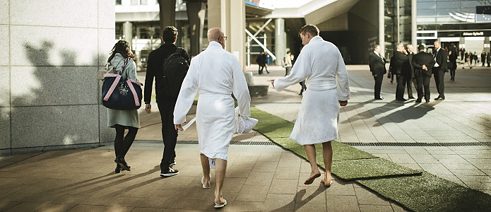Participants of the project in Brussels | Photo: Caroline Lessire
Citizens and members of the European Parliament get closer in and around a mobile sauna, discussing politics and cultures in a relaxed atmosphere. This is an event that Brussels has never experienced before and it is for Finland’s centennial.
Invitation to „Sweating for Europe“
It is early evening and the working day for most of the 751 European MPs in Brussels is not yet over. The smell of burning wood wafts around the corners of the office buildings in front of the Place du Luxembourg. Security guards and soldiers stand watchful, but they are observing the preparations taking place around the red fire engine by the Berlin artist Dida Zende from a distance. Trees in planters are being set up, changing rooms installed along with a water line for a shower. Bright-coloured lounge chairs stand decoratively on the grey stone pavement and some posters announcing “Sweating for Europe” are being hung up. This is the title of a project by the Goethe-Institut Finland. Many a lengthy debate has gotten participants into a sweat in the European Parliament, but until today no one in the Belgian capital has ever been invited to discussions in and around an old fire engine that has been converted into a mobile sauna.
An unexpected context does us good
With the abundance of the cultural events on the Brussels calendar, organizers have to think up something different to arouse interest. The Sweating for Europe discussion series, organized by the Finnish Cultural Institute together with the Goethe-Institut Brussels, the Alliance Française, Eunic Brussels, the Portuguese Instituto Camoes, the Finnish Sauna Society, Bozar and Visit.Brussels from 24 to 27 April 2017, promised an unfamiliar setting. “Europe is facing a lot of challenges these days, just think of the elections in France,” says Susanne Höhn, regional director of the Goethe-Institut in Southwestern Europe, who was enthusiastic about the idea of this series from the outset. “To take a fresh look at the problems, an unexpected context does us good. So why not send the EU parliamentarians to the sauna?”
Sauna is Finnish folk culture
She and Cristina Nord, head of programming at the Goethe-Institut Brussels, could not pass up having their say even at 100-degree temperatures. In bathing suits, of course, for public nudity is taboo in Belgium. Even in Finland, men and women do not get completely naked when they are together in the sauna unless they are family. But people sweat regularly; it is part of Finnish folk culture in the way, say, an abundant breakfast is in Germany.
Pro Europe to the last second
“The sauna is almost sacred in our country,” says Aleksi Malmberg, head of the Finnish Cultural Institute in Brussels. The Nordic country is celebrating its centennial this year. For Malmberg, it was the obvious choice to make the sauna the jubilee theme. “The sauna brings people together and helps them understand each other better,” he says. Lucy Anderson, a British parliamentarian (Labour), didn’t need a lot of convincing to take part. She moved listeners with her distinct words against the Brexit and for the EU. After a sweating session she sat with other parliamentarians in a white terry-cloth robe in front of the audience in the Parliament building and said, “We understood that there was a choice. Nevertheless, I hope that people will rethink the situation.” And she promised to work for Europe until the last second.
Brussels is not to blame for everything
Mikko Fritze, director of the Goethe-Institut in Amsterdam and Finnish-speaking moderator on the first evening, asked about the “hottest” topic the parliamentarians are currently working on. “France and Turkey,” they agreed, but also the imminent famine in some African countries. Finnish Green politician Heidi Hautala warned that the situation there was a race against time. “What is wrong in Europe?” asked a man from the audience. Merja Kyllönen (NGL) confessed that she felt too far away from the “normal lives of the people” and warned that Europe should stop listening to the rules of the markets. Heide Hautala countered, “Look at what Europe has achieved. Some countries blame Brussels for their own problems.”
A peaceful scene
Considering the peaceful scene offered in the hours around the sauna made it hard to believe that the European order we have experienced over past decades might be endangered. After the invited politicians, the sauna in Dida Zende’s fire engine was accessible to everyone. People not only talked politics, but about films, about languages, holiday plans and everyday life in Brussels. It is not always easy in the Belgian capital, but it is certainly eventful, according to the consensus: a city as a microcosm in complex Europe.
How sexy is Europe?
Author Katja Kullmann, the moderator of the MPs on the second sauna evening, asked how they would describe Europe if it were a person. “Beautiful,” replied Jo Leinen (SPD) from Germany, although he missed personalities like Mitterrand or Kohl. Not quite as sexy as in the early days, said the Czech Liberal Pavel Telicka. He compared Europe with an aging lady. Ultimately, however, all parliamentarians, regardless of their party membership, agreed that they would fight for cohesion. Work on the European project will still cost us plenty of sweat.
-
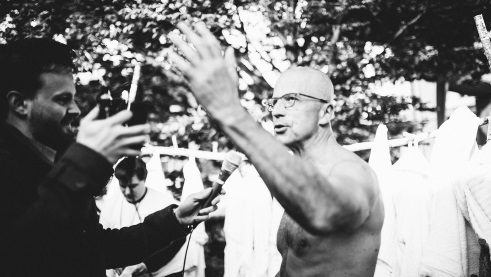 Foto: Caroline Lessire
Foto: Caroline Lessire
Teilnehmer beim Interview
-
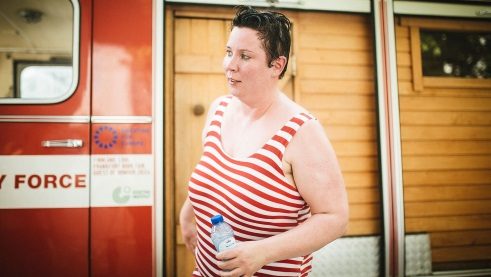 Foto: Caroline Lessire
Foto: Caroline Lessire
Merja Kyllönen, Mitglied der Confederal Group of the European United Left - Nordic Green Left
-
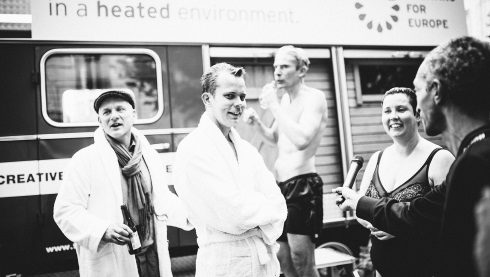 Foto: Caroline Lessire
Foto: Caroline Lessire
Teilnehmer nach dem Saunagang
-
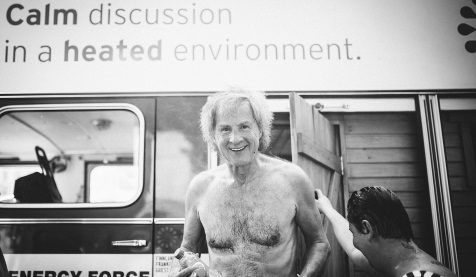 Foto: Caroline Lessire
Foto: Caroline Lessire
Jo Leinen: Fraktion der Progressiven Allianz der Sozialdemokraten im Europäischen Parlament
-
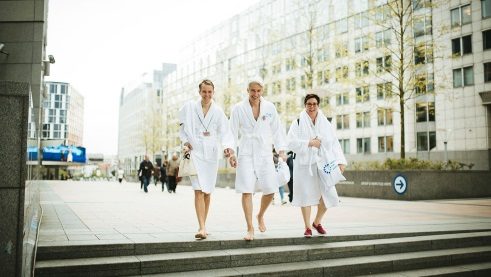 Foto: Caroline Lessire
Foto: Caroline Lessire
Aleksi Malmberg, Mikko Fritze und Merja Kyllönen
